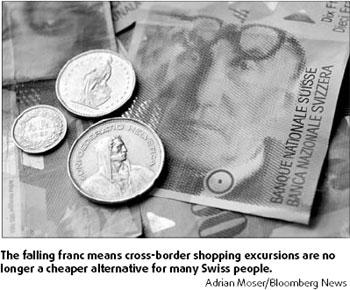Germans pay dearly as Swiss stay at home
Sales are down at Kuecuek Coekelekci's kebab stand in Jestetten, Germany. The reason: Many of his customers from neighboring Switzerland are nowhere to be found.
"When I tell customers that I haven't seen them in a long time and ask them where they've been, they tell me it's become more expensive," Coekelekci says as he sits next to the half-empty parking lot of an Aldi supermarket, drinking coffee as Turkish music blares behind him.
The franc's four-year slide against the euro - down 13 percent since the start of 2003 - means the Swiss are cutting back on the 2 billion francs ($1.7 billion) they spend annually in trips across the border, taking a bite out of businesses all along the German side. In a turnabout, it's now retailers on the Swiss side reporting rising earnings.

"It's not worth it anymore" to make the trip, says Yvonne Altherr, an entrepreneur from near Zurich. As she rushes back to her car after a meeting in Germany, she doesn't even glance at the advertisement luring customers in bold letters with the promise of "Everything for your car: Just cheaper than in Switzerland".
In the past, Swiss consumers have been willing to drive up to 400 kilometers to avail themselves of prices that might have been half those in their local stores, a 2005 survey by Coop, Switzerland's second-largest retailer, showed.
As recently as May 2006, a chocolate bar that cost 69 cents in Germany was 97 cents in Switzerland, according to an AC Nielsen survey. A bag of potato chips went for 1.59 euros against 2.10 euros, and a disposable razor cost 2.59 euros versus 4.71 euros.
Now, consumers' rationales for trekking to Germany are weakening along with the franc, whose decline has been partly spurred by the popularity of the so-called carry trade: investors borrowing at low rates in Switzerland, where the central bank's benchmark stands at 2.75 percent, to put the money in countries where they get a higher return. The European Central Bank's key rate is 4 percent.
As if the disappearing price gap isn't enough to keep shoppers home, the 148 percent increase in oil prices since the start of 2003 has also made the drive itself more expensive.
The percentage of Swiss who engage in so-called consumer tourism, crossing the border at least once a month to shop, has fallen to 7 percent, from 9 percent in 2005, according to a survey by market-research company AC Nielsen in April.
"I used to consider it like a nice excursion," says Karin Kofler, a 38-year-old journalist who in the past traveled 70 minutes by train from Zurich to Konstanz with her infant son to stock up on beauty products and baby foods. "Now, I just walk a short distance, or even get everything delivered home."
The Federation of Migros Cooperatives, Switzerland's largest retailer, says sales in the eastern region, which adjoins Germany, rose a record 3 percent in the five months through May.
"Shopping tourism will go down," says Reto Conrad, chief financial officer of Emmi Schweiz AG, the biggest Swiss dairy company, based in Lucerne. "We're fully competitive."
Retailers on the German side, who rely on the Swiss for up to 60 percent of their sales, say they aren't ready to give up.
"We've just given the store a facelift and are about to launch discounts," says Ingeborg Bielert, deputy head of the Markant supermarket in Lottstetten, just across the border in Germany, where staff waiting behind the bread and meat counters outnumber shoppers.
And to some Swiss, the trip is still worth making. Carolina Colelli, 45, drives to Germany every two weeks to spend about 140 euros on chocolate, dairy products and meat, which have been largely unaffected because Switzerland still shields its agricultural goods from competition.
Bloomberg News
(China Daily 10/12/2007 page16)














